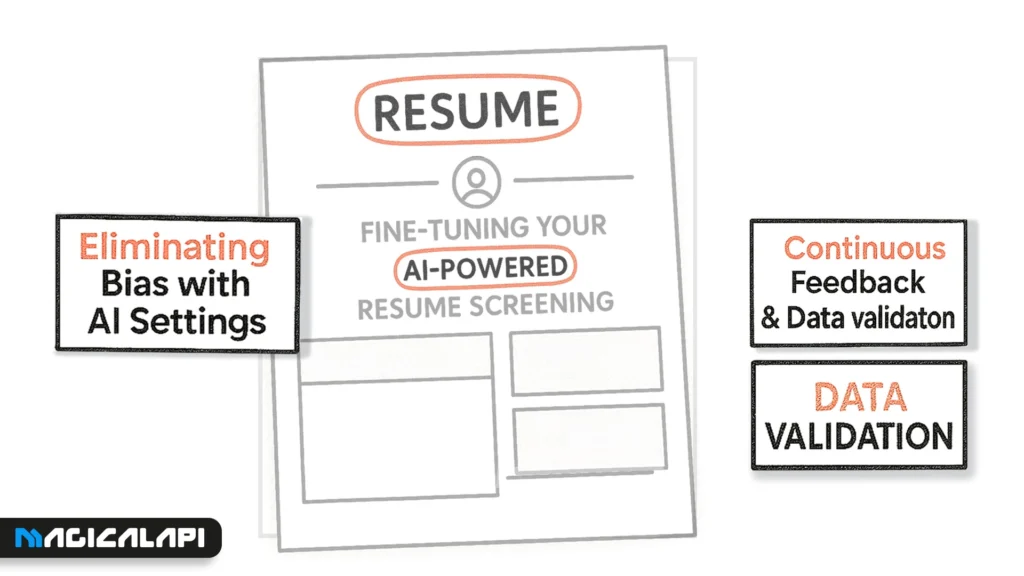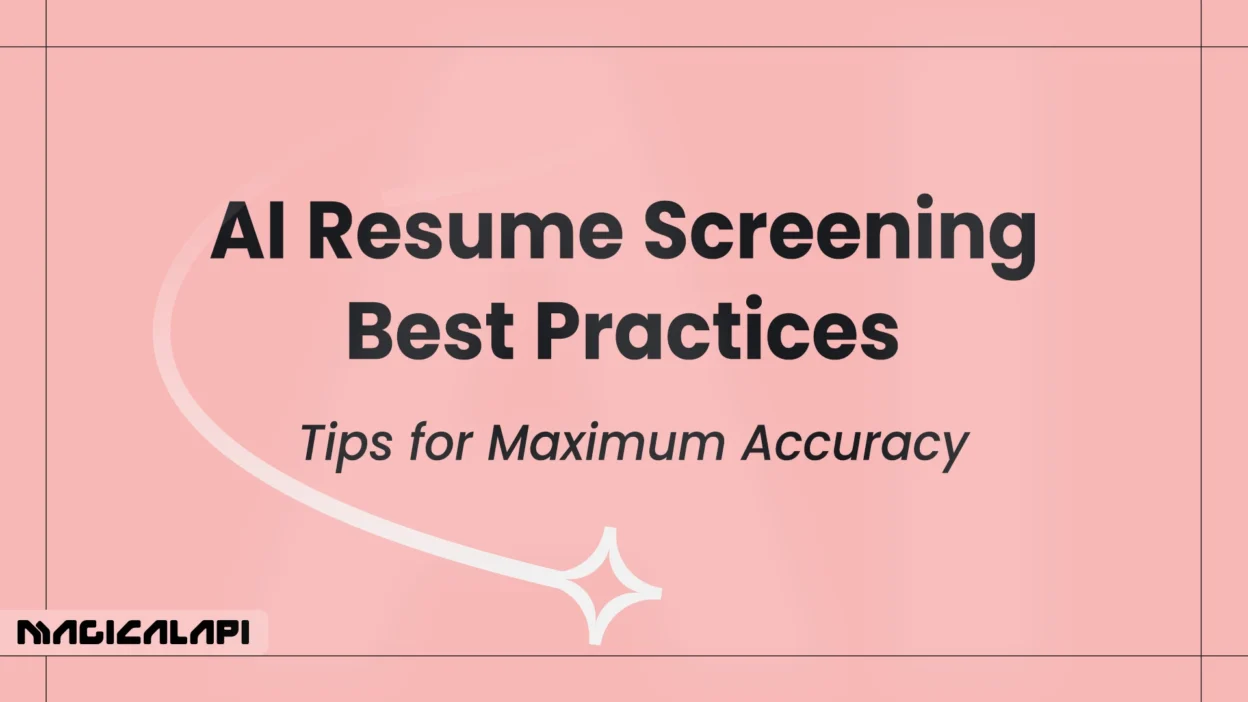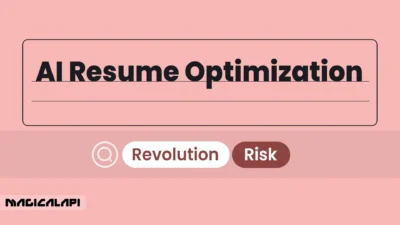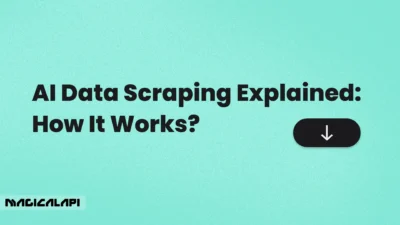As the recruiting market is moving at warp speed now, recruiters are turning to technology to try and speed up the talent acquisition process. Among these innovations, AI resume screening is a genuine game-changer. By automating the resume screening process upfront, AI tools allow recruiters to conserve time, reduce bias, and bring top candidates to the surface more quickly.
However, leveraging AI resume screening to its full capabilities requires strategy and finesse. In this guide, we’ll explore what AI resume screening is whether should I Opt Out of AI Resume Screening?, its benefits and challenges, and best practices to ensure maximum accuracy in your hiring process.
Table of Contents
What Is AI Resume Screening and How Does It Work?
AI resume screening uses artificial intelligence to screen and rank job applicants based on predetermined criteria. These systems leverage natural language processing (NLP), machine learning, and predictive analytics to search for keywords, experience, skills, and qualifications in a resume against a job description.
Magical Resume Checker
Discover the full potential of the Magical Resume Checker and explore the various options available to enhance your resume, optimize it for applicant tracking systems (ATS), and improve your chances of landing your dream job.
Manual screening is a time-consuming process that requires reading thousands of resumes one by one, whereas AI screens thousands in a matter of seconds and ranks them or shortlists the most appropriate ones for the position.
The process usually goes this way:
- Job Criteria Input: Human recruiters input the job description, qualifications, and skills needed to the AI system.
- Resume Parsing: AI extracts applicable information from resumes, such as education, work experience, and certifications.
- Candidate Ranking: The system ranks and scores candidates according to how well they fit the job criteria.
- Shortlist Generation: Top candidates are flagged for detailed evaluation by human recruiters.
To find the basics of a resume, view our article on What Is a Resume? AI screening technology is intended to complement, not replace, human judgment, and therefore, a great collaborator in modern hiring.
Key Benefits of AI Resume Screening for Recruiters
There are several advantages to AI resume screening that transform the hiring process:
- Time Efficiency: AI reviews dozens of resumes in minutes, allowing recruiters to interview and engage with candidates.
- Less Bias: When properly set up, AI software can aid in eliminating unconscious bias by considering skills and qualifications and not names, accents, and other identifying information.
- Greater Accuracy: AI recognizes applicants with strong congruence to job requirements, ensnaring fewer qualified applicants.
- Scalability: One vacancy or vacancies in the hundreds, AI handles large volumes of applications without diminishing quality.
- Data-Driven Insights: The majority of AI tools provide insights into analytics, such as skills gaps or trends in applicants, to incorporate into data-driven hiring choices.
With these benefits, recruiters are in a position to automate and make more effective decisions.
Read More: How to Write a Resume with AI?
Top Challenges and Limitations of AI Resume Screening
Though power of AI resume screening is great, it is not without challenges. Proper consideration of the below-stated limitation helps to leverage the technology properly:
- Over-Reliance on Keywords: Certain AI algorithms are more focused on keyword matching and less on context, which could lead to overlooking candidates with the same but non-standard phrasing.
- Bias in Algorithms: If trained on biased data (e.g., past hiring trends biased towards certain groups), AI tends to favor the same.
- Insufficiency of Human Judgment: AI may be resistant to understanding non-conventional career paths or intangible abilities like creativity and leadership.
- Candidate Irritation: Job candidates may become upset if they are rejected without concrete-and-fast reasons or if they’re unsure how to get past ai resume screening.
To avoid such pitfalls, recruiters should couple AI with human judgment and use their systems regularly for objectivity and accuracy.
Read More: How to tailor your resume to a job?
Best Practices for Implementing AI Resume Screening in Your Hiring Process

To maximize the benefits of AI resume screening, follow these best practices:
- Define Specific Job Requirements: Provide the AI with specific, detailed requirements so the AI will screen resumes properly. Avoid vague phrases like “team player” without additional definition.
- Train the AI on Varying Data: Train the machine on a varied, representative dataset to reduce the likelihood of bias. Refresh the training data every now and then to reflect evolving job markets.
- AI + Human Verification: Use AI to generate a shortlist, but have recruiters confirm top candidates to ascertain soft skills and culture fit.
- Provide Transparent Feedback: Where possible, inform candidates about the screening process and give recommendations for how to improve their resumes. Our Resume checker can help applicants optimize their resumes to AI applications.
- Monitor and Audit Performance: Regularly review the performance of the AI through the tracking of metrics like candidate quality, diversity, and false negatives (well-qualified candidates incorrectly placed by the system).
- Stay Compliant with Regulations: Ensure your AI solution is compliant with labor regulations and data privacy legislation, such as GDPR or EEOC directives.
By following these best practices, you can harness the power of AI while guaranteeing fairness and accuracy in your hiring process.
Spot the Resume Red Flags before recruiters do—get a free, expert resume audit now!
How to Evaluate and Choose an AI Resume Screening Tool
Choosing the appropriate AI resume filtering technology can actually position you for success at hiring. In comparing different solutions, there are a few essential things to remember.
To start with, consider how tailored and precise the tools are. Ideally, you’d want a system that enables you to customize the screening criteria to meet the special needs of your business and the specific nature of the job you’re hiring for. Increasingly, it’s also important to select a platform that is strongly committed to equity, possibly offering things like blind screening to reduce bias, or even bias audit tools to put it under constant scrutiny.
Think about how well it will integrate with your existing systems as well. A great AI screening solution should arrive smoothly alongside your existing ATS or other HR tech to avoid those pesky data silos. And don’t forget about user experience, either – a clean, easy-to-use interface is valuable for both your recruiters who will be utilizing it day-in and day-out, as well as to the applicants who might need to use it.
Apart from the software itself, examine the level of support and training offered by the vendor. Proper customer support and comprehensive training materials may be worth the effort in enabling your staff to derive maximum value out of the tool. And of course, you’ll also have to see whether the tool would scale with your recruitment needs and whether its price will remain within your means.
Prior to making a final decision, it’s always wise to ask for demos or trials. This way, you will have a better sense of how the tool integrates with actual resumes. Trying out a few of the different ones will provide you with a sense of what will actually be the best solution for your business.
Optimizing Resumes for AI Screening: Tips for Candidates
For candidates interested in beating AI resume screening, some strategic adjustments would be beneficial. Following are practical tips for getting job seekers noticed:
- Use Specific Keywords: Tailor your resume according to the job posting, applying special phrases and techniques mentioned in the ad.
- Keep It Simple: Avoid complex designs, graphics, or headers that would confuse AI parsers. Employ normal fonts and plain section titles.
- Highlight Quantifiable Results: Use numbers to quantify your achievement (e.g., “Increased sales by 20%” rather than “Improved sales”).
- Emphasize Industry Jargon: AI will prefer terminology particular to the task or industry, so include certifications, software, or jargon where appropriate.
- Test Your Resume: Our Resume checker is just one example of a tool that can analyze your resume and give feedback on AI optimality.
By refining their resumes, applicants can improve their prospects of clearing AI screening and being seen by human recruiters.
Addressing Ethical Considerations in AI Resume Screening
Ethics are a core part of AI resume screening. To make your process equitable and goal-oriented, adhere to these guidelines:
- Encourage Fairness: Regularly audit your AI system for and eliminate biases, i.e., bias against certain schools or parts of the population.
- Provide Transparency: Inform job candidates that AI is utilized in the screening process and provide education, such as our “What Is a Resume?” guide, to help prepare them.
- Respect Data Privacy: Use data protection friendly software and handle candidates’ personal details with utmost security.
- Involve Stakeholders: Engage HR departments, lawyers, and diversity officials to join the implementation process so that company values are ingrained in AI adoption.
By prioritizing ethics, you can win candidates’ trust and establish a streamlined but equitable recruitment process.
Future Trends: The Next Generation of AI Resume Screening
The future of AI resume screening looks bright, with some on-rising trends likely to drive its functionality and influence on hiring effectiveness and equity even further:
- High-End Natural Language Processing (NLP): Next-generation AI will be powered by high-end NLP that is more context-aware. This will ensure more precise interpretation of resume formats of different types and enable finer identification of critical soft skills, such as problem-solving and critical thinking, that are hard for traditional systems to process.
- Personalized Candidate Experiences and Live Feedback: We anticipate more customized interactions from AI-based apps, possibly even providing candidates with more customized feedback in real-time. This could aid applicants in refining their submissions, thus improving application quality and candidate experience.
- Holistic Evaluation through Multi-Modal Merging: The merger of AI with other evaluation technologies is bound to expand. This could be considering information from video interviews or skill tests together with resume information, presenting the recruiter with a complete and holistic evaluation of a candidate’s suitability, always keeping ethics as the top priority.
- Advancements in Bias Reduction: While complete “bias-free” algorithms are challenging work-in-progress, significant research and development also go into putting more sophisticated technologies to work identifying, tagging, and minimizing biases in all AI screening technologies. The concept is to enable increasingly equitable and justifiable results for all applicants.
- Predictive Analytics for Strategic Recruitment: Future AI technologies will presumably employ predictive analytics more heavily. From the analysis of past recruitment and performance data, the systems may be able to offer insight into the potential for long-term success of the candidate in a specific job role or corporate environment and therefore help the recruiters make more strategic and better-informed recruitment choices.
As they develop, they have the potential to change hiring methods so they are not only better, but smarter and more equitable for employers and employment applicants alike.
Conclusion: AI Resume Screening
AI resume screening is revolutionizing the science of hiring by saving time, reducing bias, and improving the quality of hire. It depends on proper usage. By creating effective guidelines, implementing AI with human intuition, and giving importance to equality, recruiters can ensure high precision and develop an improved hiring process. To candidates, it is vital to understand how to circumvent AI resume screening by Resume optimization to become the focal point. As technology continues to evolve with AI, staying abreast of trends and best practices will place your organization at the forefront of talent acquisition.
FAQs for AI Resume Screening
1. What is AI resume screening?
AI resume screening employs machine learning to screen resumes and classify candidates according to the requirements of the job, making hiring more efficient.
2. How do applicants augment their ability to pass AI resume screening?
Applicants should personalize their resumes with the relevant keywords, keep formatting minimal, and include quantification of achievements. Tools like our Resume checker can help them.
3. Is bias possible in AI resume screening?
Yes, if being trained on biased information, AI will make unjustified predictions. Audits and muddled training data will avert that.
4. How do I choose the best AI resume screening tool?
Look for tools with customizable criteria, bias mitigation features, and seamless integration into your HR systems. Request demos to try out performance





